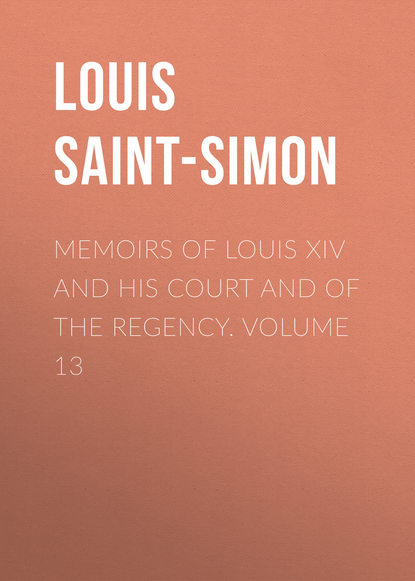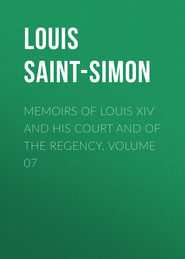По всем вопросам обращайтесь на: info@litportal.ru
(©) 2003-2024.
✖
Memoirs of Louis XIV and His Court and of the Regency. Volume 13
Настройки чтения
Размер шрифта
Высота строк
Поля
M. le Duc d'Orleans, surprised, said to her she was then mad.
"Be it so," replied she, "but you will go."
"But I tell you I will not go," he rejoined.
"Yes, yes, I tell you," said she; "you will go."
"But," replied he, "this is admirable. You say M. de Saint-Simon is quite right, why then should I go?"
"Because I wish it," said she.
"Very good," replied he, "and why do you wish I should go—what madness is this?"
"I wish it because—," said she.
"Oh, because," replied he, "that's no reason; say why you wish it."
(After some dispute) "You obstinately desire then to know? Are you not aware that the Abbe Dubois and I quarreled four days ago, and that we have not yet made it up. He mixes in everything. He will know that you have been with me to-night. If to-morrow you do not go to his consecration, he will not fail to believe it is I who have hindered you; nothing will take this idea out of his head; he will never pardon me; he will undermine in a hundred ways my credit with you, and finish by embroiling us. But I don't wish such a thing to happen, and for that reason you must go to his consecration, although M. de Saint-Simon is right."
Thereupon ensued a feeble debate, then resolution and promise to go, which was very faithfully kept.
As for me I could only deplore the feebleness of the Regent, to whom I never afterwards spoke of this consecration, or he to me; but he was very much ashamed of himself, and much embarrassed with me afterwards. I do not know whether he carried his weakness so far as to tell Dubois what I had said to hinder him from going to the ceremony or whether the Abbe was told by La Parabere, who thought thus to take credit to herself for having changed the determination of M. le Duc d'Orleans, and to show her credit over him. But Dubois was perfectly informed of it, and never pardoned me.
The Val de Grace was chosen for the consecration as being a royal monastery, the most magnificent of Paris, and the most singular church. It was superbly decorated; all France was invited, and nobody dared to stop away or to be out of sight during the whole ceremony.
There were tribunes with blinds prepared for the ambassadors and Protestant ministers. There was another more magnificent for M. le Duc d'Orleans and M. le Duc de Chartres, whom he took there. There were places for the ladies, and as M. le Duc d'Orleans entered by the monastery, and his tribune was within, it was open to all comers, so that outside and inside were filled with refreshments of all kinds, which officers distributed in profusion. This disorder continued all day, on account of the large number of tables that were served without and within for the subordinate people of the fete and all who liked to thrust themselves in. The chief gentlemen of the chamber of M. le Duc d'Orleans, and his chief officers did the business of the ceremony; placed distinguished people in their seats, received them, conducted them, and other of his officers paid similar attentions to less considerable people, while, all the watch and all the police were occupied in looking after the arrival and departure of the carriages in proper and regular order.
During the consecration, which was but little decent as far as the consecrated and the spectators were concerned, above all when leaving the building, M. le Duc d'Orleans evinced his satisfaction at finding so many considerable people present, and then went away to Asnieres to dine with Madame Parabere—very glad that a ceremony was over upon which he had bestowed only indirect attention, from the commencement to the end. All the prelates, the distinguished Abbes, and a considerable number of the laity, were invited during the consecration by the chief officers of M. le Duc d'Orleans to dine at the Palais Royal. The same officers did the honours of the feast, which was served with the most splendid abundance and delicacy. There were two services of thirty covers each, in a large room of the grand suite of apartments, filled with the most considerable people of Paris, and several other tables equally well served in adjoining rooms for people less distinguished. M. le Duc d'Orleans gave to the new Archbishop a diamond of great price to serve him as ring.
All this day was given up to that sort of triumph which draws down neither the approbation of man nor the blessing of God. I saw nothing of it all, however, and M. le Duc d'Orleans and I never spoke of it.
The Comte de Horn had been in Paris for the last two months, leading an obscure life of gaming and debauchery. He was a man of two-and-twenty, tall and well made, of that ancient and grand family of Horn, known in the eleventh century among the little dynasties of the Low Countries, and afterwards by a long series of illustrious generations. The Comte de Horn in question had been made captain in the Austrian army, less on account of his youth than because he was such an ill-behaved dog, causing vast trouble to his mother and brother. They heard so much of the disorderly life he was leading in Paris, that they sent there a confidential gentleman with money to pay his debts, to try and persuade him to return, and failing in this, to implore the authority of the Regent (to whom, through Madame, the Horns were related), in order to compel him to do so. As ill-luck would have it, this gentleman arrived the day after the Comte had committed the crime I am about to relate.
On Friday, the 22nd of March, 1720, he went to the Rue Quincampoix, wishing, he said, to buy 100,000 ecus worth of shares, and for that purpose made an appointment with a stockbroker in a cabaret. The stock- broker came there with his pocket-book and his shares; the Comte de Horn came also, accompanied, as he said, by two of his friends; a moment after, they all three threw themselves upon this unfortunate stock- broker; the Comte de Horn stabbed him several times with a poniard, and seized his pocket-book; one of his pretended friends (a Piedmontese named Mille), seeing that the stock-broker was not dead, finished the work. At the noise they made the people of the house came, not sufficiently quick to prevent the murder, but in time to render themselves masters of the assassins, and to arrest them. In the midst of the scuffle, the other cut-throat escaped, but the Comte de Horn and Mille were not so fortunate. The cabaret people sent for the officers of justice, who conducted the criminals to the Conciergerie. This horrible crime, committed in broad daylight, immediately made an immense stir, and several kinsmen of this illustrious family at once went to M. le Duc d'Orleans to beg for mercy; but the Regent avoided speaking to them as much as possible, and very rightly ordered full and prompt justice to be done.
At last, the relatives of Horn penetrated to the Regent: they tried to make the Count pass for mad, saying even that he had an uncle confined in an asylum, and begging that he might be confined also. But the reply was, that madmen who carried their madness to fury could not be got rid of too quickly. Repulsed in this manner, they represented what an infamy it would be to their illustrious family, related to nearly all the sovereigns of Europe, to have one of its members tried and condemned. M. le Duc d'Orleans replied that the infamy was in the crime, and not in the punishment. They pressed him upon the honour the family had in being related to him. "Very well, gentlemen," said he, "I will divide the shame with you."
The trial was neither long nor difficult. Law and the Abbe Dubois, so interested in the safety of the stock-jobbers (without whom the paper must have fallen at once), supported M. le Duc d'Orleans might and main, in order to render him inexorable, and he, to avoid the persecutions he unceasingly experienced on the other side, left nothing undone in order to hurry the Parliament into a decision; the affair, therefore; went full speed, and it seemed likely that the Comte de Horn would be broken on the wheel.
The relatives, no longer hoping to save the criminal, thought only of obtaining a commutation of the sentence. Some of them came to me, asking me to save them: though I was not related to the Horn family, they explained to me, that death on the wheel would throw into despair all that family, and everybody connected with it in the Low Countries, and in Germany, because in those parts there was a great and important difference between the punishments of persons of quality who had committed crimes; that decapitation in no way influenced the family of the decapitated, but that death on the wheel threw such infamy upon it, that the uncles, aunts, brothers, and sisters, and the three next generations, were excluded from entering into any noble chapter, which, in addition to the shame, was a very injurious deprivation, annihilating the family's chance of ecclesiastic preferment; this reason touched me, and I promised to do my best with M. le Duc d'Orleans to obtain a commutation of the sentence.
I was going off to La Ferme to profit by the leisure of Holy Week. I went therefore to M. le Duc d'Orleans, and explained to him what I had just learnt. I said that after the detestable crime the Comte de Horn had committed, every one must feel that he was worthy of death; but that every one could not admit it was necessary to break him on the wheel, in order to satisfy the ends of justice. I showed him how the family would suffer if this sentence were carried out, and I concluded by proposing to the Regent a 'mezzo termine', such as he was so fond of.
I suggested that the decree ordering death by the wheel should be pronounced. That another decree should at the same time be prepared and kept ready signed and sealed, with only a date to fill in, revoking the first, and changing the punishment into decapitation. That at the last moment this second decree should be produced, and immediately afterwards the head of the Comte de Horn be cut off. M. le Duc d'Orleans offered no objection, but consented at once to my plan. I said to him, by way of conclusion, that I was going to set out the next day, and that I begged him not to be shaken in the determination he had just formed, by the entreaties of Dubois or Law, both of whom were strongly in favour of punishment by the wheel. He assured me he would keep firm; reiterated the assurance; I took leave of him; and the next day went to La Ferme.
He was firm, however, in his usual manner. Dubois and Law besieged him, and led the attack so well that he gave in, and the first thing I learnt at La Ferme was that the Comte de Horn had been broken alive on the wheel at the Greve, on Holy Friday; the 26th March, 1720, about 4 o'clock in the afternoon, and the scoundrel Mille with him on the same scaffold, after having both suffered torture.
The result of this was as I anticipated. The Horn family and all the grand nobility of the Low Countries, many of Germany, were outraged, and contained themselves neither in words nor in writings. Some of them even talked of strange vengeance, and a long time after the death of M. le Duc d'Orleans, I met with certain of the gentlemen upon whose hearts the memory of this punishment still weighed heavily.
ETEXT EDITOR'S BOOKMARKS:
A cardinal may be poisoned, stabbed, got rid of altogether
Enriched one at the expense of the other
Few would be enriched at the expense of the many
I abhorred to gain at the expense of others
Juggle, which put the wealth of Peter into the pockets of Paul
Not allowing ecclesiastics to meddle with public affairs
People with difficulty believe what they have seen
Rome must be infallible, or she is nothing











